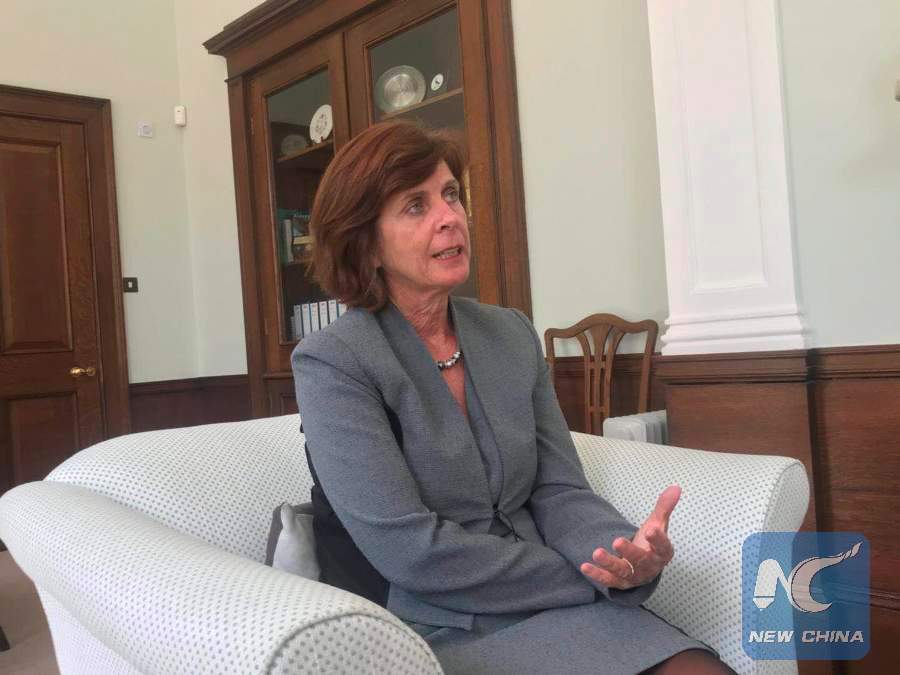 Oxford vice chancellor Louise Richardson is in an interview with Xinhua on April 3. (Xinhua/Gu Zhenqiu)
Oxford vice chancellor Louise Richardson is in an interview with Xinhua on April 3. (Xinhua/Gu Zhenqiu)
by Gui Tao, Gu Zhenqiu, Larry Neild
LONDON, April 20 (Xinhua) -- Britain's decision to quit the European Union (EU) could lead to the decline of the number of EU students at the University of Oxford, which currently stands at about 15 percent of the university's places, Professor Louise Richardson, the university's vice chancellor told Xinhua.
Around 70 percent of the people in the Oxford area voted remain in the June 2016 referendum.
One of the implications of the decision to leave is that EU students would face the higher fees paid by international students from outside the EU bloc.
In a recent exclusive interview, Richardson told Xinhua: "We worry about Brexit. We're concerned about Brexit for three reasons, firstly because of its impact on our European students," the academic, Oxford's first ever female vice chancellor, said.
"We're committed at Oxford to having an international student body," she added: "About 15 percent of our students are citizens of the EU and we worry that that number will decline."
"They will have to pay the same fees as other international students whereas at the moment they pay the same fees as home students which are much lower. We worry that the number would reduce."
Another concern for Oxford is the impact of Brexit on university staff. Currently a quarter of Oxford's academic and research staff are from EU mainland countries.
Richardson said: "We worry that they will feel unwelcome in Britain, or that they will choose to go home, or that they would be worried about the ability of their children to remain in Britain."
Following the latest round of negotiations which provided more clarity and reassurance about the post-Brexit status of Europeans in Britain, Richardson said she was much less worried than she was after the referendum.
"We haven't experienced a loss of our academics, but we thought we might," she added.
Richardson's other major worry is the impact of Brexit on Oxford's pan-European research and collaboration.
"We belong to a network of collaborators across Europe with free movement back and forth, and this is critical to our success," she explained.
"We also receive a great deal of funding, with over 14 percent of our research funding coming from the European Research Council. We worry about losing access to that research funding."
"Students, staff, the network of collaborators and the research funding are all significant matters of concern for us," added Richardson.
On a broader level, Richardson admits to being worried that Britain has been so focused on Brexit that attention has been distracted.
"I'm worried that the economy of the country will suffer, and that will naturally have an effect on government funding of universities," she said.
Another major topic in business, professional and public life in Britain is the so-called gender pay gap.
Prime Minister Theresa May and her senior ministers have embarked on a strategy to see the gap narrowed, and also see more females following the example of Richardson by winning top jobs, particularly at boardroom level.
Professions such as academia are shaped like a pyramid, the higher up you go, the fewer women there are, and the gender pay gap is reflected by that, says Richardson.
"As in most other parts of society, women are over represented at the lower rungs and not yet highly enough represented at the most senior levels," she added.
Oxford, insists Richardson, is utterly committed to changing that situation.
"As with other issues we end to reflect society rather than change it. Although over the longer term I think this will change," she predicts.
Richardson said analysis of data reveals that the biggest problem is the motherhood pay gap.
"When you look more closely you see that where women fall off the career track it tends to be when they have children. For understandable reasons, raising children is very demanding, and women bear a disproportionate role in child rearing. And I think that's the biggest single explanation for why there are fewer women at senior levels, and I think it's the biggest explanation for the gender pay gap."
Whether gender pay, or gender mix becomes a reality in universities, one thing Richardson is convinced about is that robot teachers will never replace humans any time soon.
"I'm not anticipating robot teachers in my lifetime, though I do anticipate robots assisting our teachers," she said,
Richardson added that a recent study by Oxford Martin School predicted 47 percent of all jobs could eventually be displaced by robots.
"And I don't think teachers will be one of them," she added: "If you look at the tutorial system at Oxford, it is based on one-on-one, or two-on-one interaction with the tutor. It is about fashioning an argument, having your argument criticized and having differences to defend. No computer design can do that."
Richardson added: " There's nothing like learning the humanities to do that, to inhabit the mind of another. A computer cannot do that yet, so while I think technology is going to affect real change in education, I don't think we're going to be out of a job yet."

